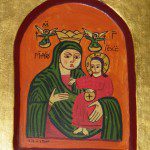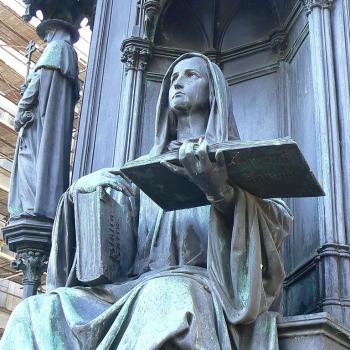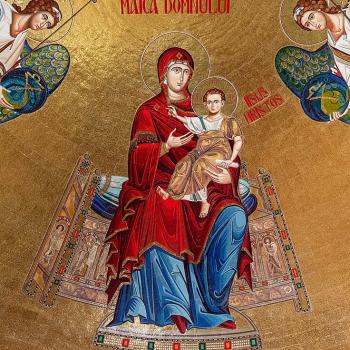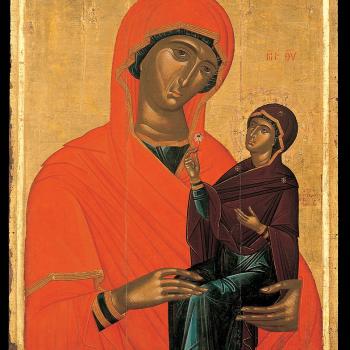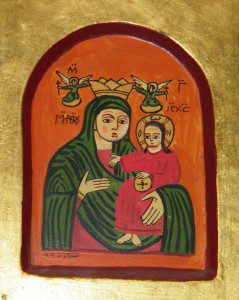
Despite the analysis and explanation which is to follow, it is important to point out from the start that the logical outcome of saying Jesus is God is to say that Mary is the Mother of God. To deny the title, Theotokos or Mater Dei, to Mary either leads a denial of the divinity of Jesus or to deny he was born of Mary, the former indicating a rejection of his divinity, the latter his humanity.
Even in Scripture, this outcome is at least implicitly indicated by Elizabeth when she asked, “And why is this granted me, that the mother of my Lord should come to me?” (Lk 1:43 RSV). Elizabeth declared Mary to be the mother of the Lord, τοῦ κυρίου μου, which is an indication of Jesus being God because, as the Psalmist stated, the Lord is God:
The LORD is God, and he has given us light. Bind the festal procession with branches, up to the horns of the altar! Thou art my God, and I will give thanks to thee; thou art my God, I will extol thee. O give thanks to the LORD, for he is good; for his steadfast love endures for ever! (Ps 118:27-29 RSV).
Some might suggest that I am putting two verses together which do not belong together, that I am equivocating by my use of the term, “Lord.” They would agree that Jesus is, indeed, declared to be Lord, but how do we know this use of the term lord was to indicate that Jesus was a divine person? Why do we conclude here with the belief that Jesus is being declared to be God so that Elizabeth is calling Mary the Mother of God? For Elizabeth, it would be incredible for her to use the term to indicate anyone other than God, for the term had become used to indicate God, and once it had, it would be liable to confusion if it were freely used for any other reference.[1]
Yet, another answer comes to us from the opening of John’s Gospel. Just as the Psalms tells us that the Lord has given us light, so we see in John that Jesus is the one who has given us that light, the light which shines in the darkness and is not overcome by it. In this manner we can see that Jesus really is the Lord intended by the Psalms:
In the beginning was the Word, and the Word was with God, and the Word was God. He was in the beginning with God; all things were made through him, and without him was not anything made that was made. In him was life, and the life was the light of men. The light shines in the darkness, and the darkness has not overcome it (Jn 1:1-5 RSV).
The Evangelist, to confirm that the Lord God, the giver of light, has come in the flesh, showed us how John the Baptist was the personal witness of that light:[2]
There was a man sent from God, whose name was John. He came for testimony, to bear witness to the light, that all might believe through him. He was not the light, but came to bear witness to the light. The true light that enlightens every man was coming into the world. He was in the world, and the world was made through him, yet the world knew him not (Jn 1:6-10 RSV).
This light is the Word, the Word who had became flesh and dwelt among us (Jn 1:14). The Baptist, like Elizabeth his mother, revealed the lordship of Jesus, and showed us that this meant that Jesus was more than some ordinary lord, some earthly king, but God himself. Thus, Augustine, in reading Psalm 118, understood how it served to point out that Jesus is God:
“God is the Lord, who hath showed us light” (verse 27). That Lord, who came in the Lord’s Name, whom the builders refused, and who became the head Stone of the corner, that “Mediator between God and man, Jesus Christ,” is God, He is equal with the Father, He hath showed us light, that we might understand what we believed, and declare it to you who understand it not as yet, but already believe it.[3]
The divinity of Jesus, the divinity of the Lord whom Mary gave birth, is affirmed by the name (or title) given to him: “Behold, a virgin shall conceive and bear a son, and his name shall be called Emmanuel” (which means, God with us)” (Mat 1:23 RSV). We know he was given the name Jesus, but yet we are told he is called Emmanuel. What does this mean other than his divine name, the name which God uses to present someone their essential nature, is Emmanuel? For when God calls someone by name, he calls them by a name which indicates who they are in reality. Abram is renamed Abraham (cf. Gen 17:5) for this purpose, as are we, when we find ourselves victorious in Christ against sin (cf. Rev. 2:17).[4] He who is humanly named Jesus is named by God as Emmanuel, that is, God with us, for the very reason of indicating who he is.[5] As the divine use of names indicates the reality behind the name given out by God, so we know Jesus is God who is with us, which is the point of saying he will have the name or title, Emmanuel.
Jesus, therefore, is called Emmanuel in prophecy, and this prophecy is repeated in the Gospels. The Evangelist knew of the prophecy of his name, and would easily see Jesus’ name did not seem to be Emmanuel, and yet they tell us that Emmanuel really is his name. What, then, did he mean other than to state this prophetic name indicates something about the person, something about who Jesus is in reality? He is named Emmanuel, God with us, because that is who he is in his person: God with us. Personally, he is God, and he is with us, because he has assumed human nature. A divine person, God, has become man, while remaining God, thus, Emmanuel. Mary, his mother, therefore, is the mother of the person who is God, making her the Mother of God. This is the implication of prophecy as well as Elizabeth’s indication of Mary being the mother of her Lord.
More to come later in Part II
[1] The point is similar to why, in modern times, companies want to keep their trademarked name by making sure the name of their product is used only for their product and not turned into a generic term which includes rivals to the product itself. When the term Lord was determined as the way to verbally speak of God (and not YHVH), it required its other uses to be stopped.
[2] This was John’s prophetic character, and why he was the last of the prophets. The major work of the prophets was to prepare the way in Israel for the incarnation of God in the messiah, Jesus Christ. John, the last of the prophets, was able to finish the preparation and personally reveal the one whom all the prophets awaited, Jesus.
[3] St. Augustine, On the Psalms in NPNF1(8):559.
[4] A name is meant to indicate something of the person or thing named. This is especially true in Scripture, where the Holy Spirit makes sure the use of a given name can allow us a better understanding of the persons, events, and theological ramifications being portrayed by its use. That is, when given out by God, it is especially more than a mere name without content, but it is a name indicating some divine truth. Usually, it is to help reveal something of the character of the person or thing being named by God. For example, Philo explained that God renamed Abram to Abraham in order to reveal something of Abraham’s moral character to the world:
“Think not, then, any longer that the Deity bestows a change of names, but consider that what he gives is a correction of the moral character by means of symbols; for having invited the nature of heaven, and whom some call a mathematician, to a participation in virtue, he made him wise and called him so. For having given an appropriate name to his transformed disposition, he named him, as the Hebrews would call it, ‘Abraham,’ but in the language of the Greeks, ‘the elect father of sound,’” Philo, “On the Change of Names” in The Works of Philo. trans. C.D. Yonge (Peabody, Massachusetts: Hendrickson, 1993), 347.
When someone is given a name by God, and that name is established in prophecy by God, then that name reveals some truth of the person being named. Even if they have other names given to them, God’s divine name for them manifests who they are in a way any the other names do not. The point of any renaming in Scripture by God is understandable only within this context, as does the use of names in prophecies. The name is symbolic, and when it is a symbol used by God, the symbol gives a real connection between the person named and the meaning behind the name. Thus, for God to reveal the messiah is going to be Emmanuel, the name meaning God with us, we have an indication of who the person of Jesus really is.
[5] It is important to realize even his humanly-given name fulfills a prophecy. We find that the leader of Israel after Moses, that is his successor, was Joshua. Moses said that the messiah would be the prophet which came after him. We have a type of that prophet in his earthly successor, Joshua, indicating that, in reflection of that type, the true messianic prophet would himself be Joshua, that is in English, Jesus; Jesus is the final and absolute prophet after Moses, and he established the true and everlasting covenant in his blood (cf. Heb. 13:20).
Stay in touch! Like A Little Bit of Nothing on Facebook:
A Little Bit of Nothing



